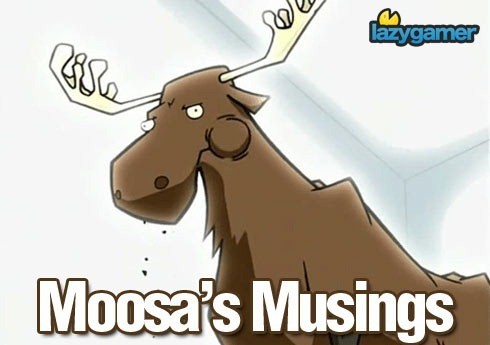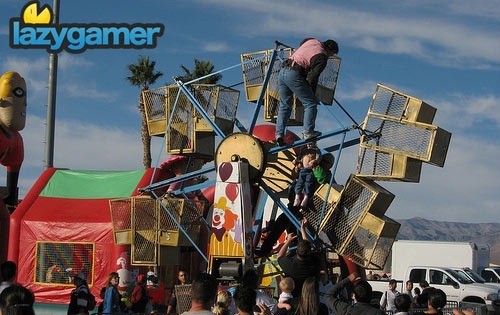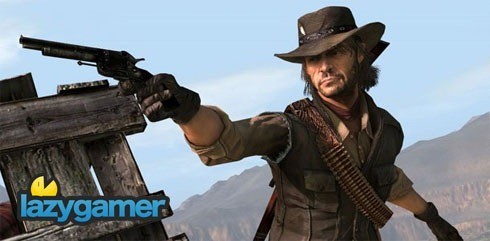
As gameplay duration extends, I feel my age going with it. Suddenly, the idea of playing forty hours of a dragon-bashing fantasy game is as daunting a marathon as one attempted backwards, one-legged, while reciting the Russian alphabet… in North Korea. This is not a complaint of my age, only my attention span. However, I’m not going to explain that to you since it’s autobiographical; and the only autobiographical posts worthy of Internet views are sex-tapes. And I have neither celebrity-status, female parts (the ones in the fridge don’t count), nor personal interest in conveying this. But with this realisation came another: that game developers often mistake choice for laziness, freedom for shallow plot-points, and endless liberty for undeveloped stories.
For many people games like Skyrim or its predecessors seem too good to be true and difficult to hate given their “open world” environments, choice-systems that apparently shape the world, and almost infinite amount of ways to tackle a situation.
But sometimes, as Francis Beckett said of disliking a friendly priest, it’s worth making the effort.
The Broken Carnival

Imagine you are going to attend some carnival, fair or Fun Park.
You’ve heard from friends and general information sites that this place is huge, open, has all the tools you need to have almost endless fun. You get there, excited, and hear, even from a distance, screams of happiness and squeals of delight. But then you pass through the gates: the carnival is broken, the rides half-formed, lazy attendants, in dirty uniforms, occasionally wander over to answer a question or two from the crowd but then light a cigarette and return to the dark corners to sniff coke off the back of a toy pony. Signs everywhere tell you where a “new” ride or fun area is. “Make it yourself” is written on signs in Comic Sans, with too many exclamation marks.
You see grown men who, having paid the very expensive entrance fee, are forcing themselves to enjoy some broken pipes; you see others holding desperately onto a once active roller-coaster and using their feet to give the illusion of motion. No one stops them: it’s “all open to their interpretation” of fun.
Would you say that a broken, massive carnival like this indicates care on the part of its creators? Would you look at the broken toys and lazy customer attendants and proclaim efficiency? This is how I view many open world games, especially the ones in Bethesda’s recent history. Perhaps the only difference between the broken carnival and, say, Fallout 3 or Skyrim is that the latter are incredibly beautiful to look at. But hardly anything in the games gives any indication that care was taken in other elements of the game.
But I don’t want to belabour my hatred of Skyrim or Bethesda’s recent history. What I’m primarily interested in is whether one can make a case for open-world games who use the excuse of freedom to not make efforts in story-telling, plot-points or character development. There are two sides to this and I want to present them fairly.
Open Worlds Allow for My Own Story

The reason Lego is the greatest toy in the world rests in the limitless results of your interaction. You can build whatever you want, with limitations only being imagination, floor-space and income. You create stories or pictures or memories during and after your creation. Similarly, in massive open worlds, there are so many stories and elements, you can create your own adventures constantly. That’s why sites which offer places to tell your own tales of Skyrim are so entertaining: almost no two players will provide similar narration in their goals, even if they were on the same quest. This is due to the random elements of the game, the unique character you create and so on.
Playing games like this by definition has you experiencing something personal. It’s like being part of an epic fantasy, but one you write and enjoy. This doesn’t make it well-written, but well-experienced. It’s the Lord of the Rings movies to the Lord of the Rings horribly-written books. And not everything needs to be well-written or brilliantly plotted. That’s like accusing Transformer’s movies for having not enough story and too much Megan Fox – that’s precisely what you’re paying for!
But if we admit this, then we should be honest and say the game in and of itself does not provide good storytelling from a top-down perspective (thought out by writers and narrated through the game). Instead, all stories in open-world games like Skyrim or Oblivion are bottom-up (experienced by players and beyond predicting by the developers). Indeed, your character is a good representation of that: a blank, silent slate that gradually becomes more refined as progress is made.
Many people love this ability of open-world games to serve as blank slates to carve your own adventure in. But, then, we shouldn’t expect our engravings to be something of top-down quality. It’s not trying to be – and the silly people from the Academy of Arts & Sciences should not pretend it does, either. (One could make the case that AAS was highlighting the bottom-up approach to story-telling, but that doesn’t seem to be the case.)
Open Worlds Allow for Developers to be Lazy in Storytelling

But what concerns me is to pretend that anyone’s made an effort to put structures in place that allow players to be part of a grand story. This is what Bioware is best at: sexily, elegantly and beautifully fitting in your character within a huge narrative, without constantly telling you how special you are. Sure, you’ll get compliments like “no one’s ever done that before” or “you’re the first human to x”, but it’s not much more than that. Skyrim, in contrast, tries too hard with its whole Dragonborn nonsense – it’s the only characteristic your character is given from a top-down perspective, so that’s all that characters mostly react to. And there’s no indication of how, why, who – no one seems particularly interested, just amazed.
And again: this is fine. But no one should pretend Skyrim is doing anything other than giving you a feature or two as foundation, so you can build a castle of personality to erect on top.
But I’m not satisfied with this distinction despite my sympathy with creating personal, little stories. Why does it have to be either/or? Why not have a strong narrative drive that carries you, that you care about, that – as your participate – changes the world around you (overthrow monarchs, become a monarch, kill children and towns, watch characters react to you differently).
As a gamer, the two worst things a game can do to me is (1) bore me and (2) remind me it’s a game. By the second I don’t mean some clever breaking of the fourth wall. I mean when, for example, the world plays out like a MMORPG but with everyone else offline. This is what much of open-worlds like Skyrim are like to me. Again, this doesn’t mean people can’t have fun in it – but then you’re playing with corpses not really characters.
Conclusion
The overarching difficulty is that people are genuinely enjoying their little stories in Skyrim. They’re enjoying the broken carnival. I don’t care whether people sleep with their sister, let alone whether they’re playing a game “right”. It’s no one’s business – but I am concerned when people defend games according to reasons that don’t make sense. People who love massive open worlds shouldn’t proclaim that story-telling elements and plot-points are good, since that’s not really the point: it’s a blank slate and it’s not trying to be, say, Deus Ex or Arkham Asylum. Furthermore, what worries me is that developers can use this as an excuse to not do anything more with a game except make a gorgeous sandbox.

I see no reason it has to be either-or. Rockstar are prime examples of doing this well, especially in my favourite game Red Dead Redemption. I don’t think anyone disputes the game has a beautiful, open and fully-realised world. And I think the way the story was told made it a fine piece of narration (even if the story itself was a bit cliché). Sure: you couldn’t buy houses or join a guild, but these were the sacrifices made to have a stable, fascinating narration that threaded everything together. It can be done and it should be done more often. Having beautiful sandboxes can be both for our own stories, bottom-up, or from on high – or as RDR showed, a bit of both. I think the more clarity we have on what specifically we think are good and bad features will make us better consumers and at least provide more vocab to our discussions in these matters.
I still, however, think that Skryim is a broken carnival. Just watch out for the broken pipes (especially my fellow PS3 owners).
Last Updated: February 20, 2012





















